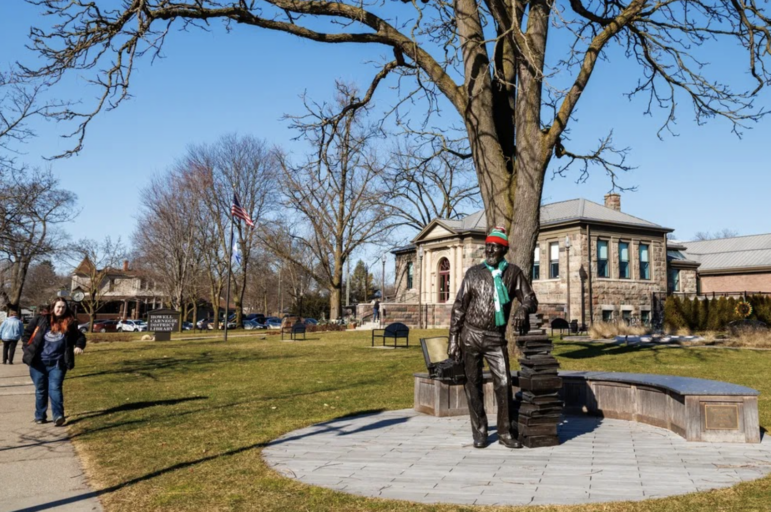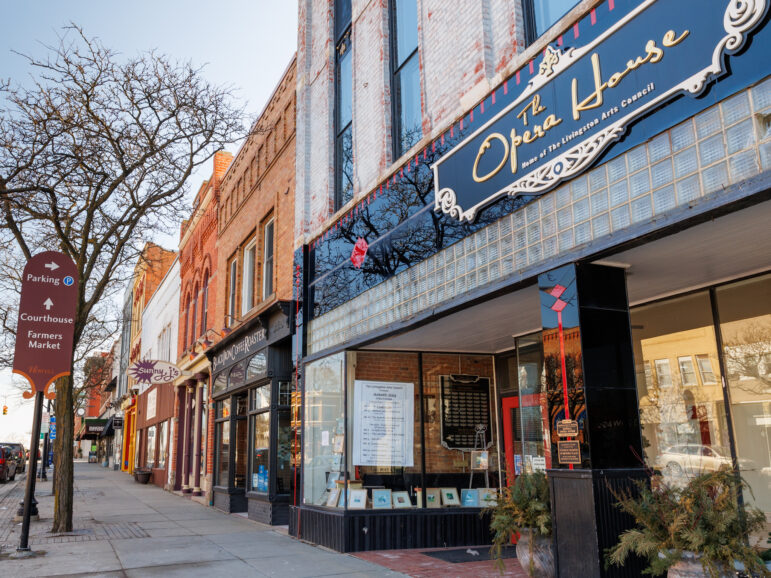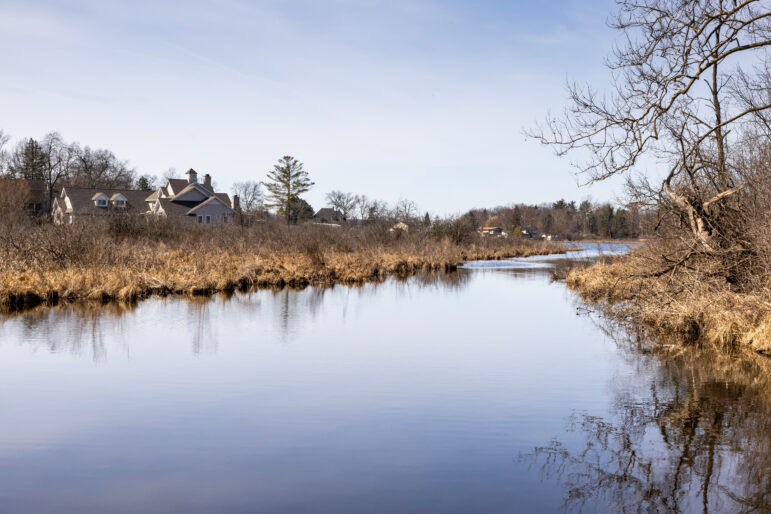
Ruth Thornton
A bronze statue of WWII veteran and professional photographer Duane Zemper wears a winter hat and scarf outside the Howell Carnegie District Library.Editor’s note: This is the 1st in a series of election year county profiles in collaboration with the MSU Journalism School, American Communities Project, Detroit Free Press and Capital News Service.
By RUTH THORNTON AND VICTOR WOODELL
Capital News Service Detroit Free Press
BRIGHTON — The first thing many people see when they drive into Livingston County from metro Detroit is a large billboard with the American flag and an eagle staring proudly down at them.
It’s easy to assume that this image sums up politics in the county, but the reality is more complicated.
The political attitudes in Livingston County seem unambiguous — in the 2020 presidential election, 61% of residents voted for President Donald Trump, who won in all townships.
But beneath the surface-level numbers, a geographic split materializes regarding just how conservative these communities really are. In Conway Township, in the northwest, Trump won 72% of the vote, while in the city of Brighton, in the county’s southeast, the vote was nearly even with 49.5% supporting Trump and 48.7% for Joe Biden.
This division is also visible in certain social and demographic patterns.
Originally consisting primarily of small villages and rural areas with family farms, in recent decades the county’s southeastern area has seen an influx of people settling and commuting to the urban and suburban areas of Metro Detroit. It’s now comparatively wealthy, with a median household income of $96,135 compared with Michigan’s $68,505.
Steve MacDarmaid, 51, a financial adviser at Edward Jones, moved to Brighton with his parents in 1976.
“There are vast differences between Brighton, Howell and Fowlerville,” he said. Although Brighton and Howell are melting pots that host a wide range of people, he says he believes that the county is both deeply Republican and conservative.
“They don’t want Joe Biden to be president. Although I don’t know how much they actually want Trump,” MacDarmaid said.
Steve Horton, 72, owns the Fowlerville News & Views in the rural northwestern corner. Born on a dairy farm near Fowlerville, he has seen many changes.
“Most people migrated from western Detroit or Livonia to get away from development in the 1960s or ’70s,” he said. Some moved to avoid school desegregation, others to find affordable housing. “The farther west you go, the more traditional the people are, and the more Trump flags you see.”
Horton said local attitudes are driven primarily by national issues. People here are polarized because of what they read online.
“Politics isn’t local anymore,” Horton said.
George Moses, 81, grew up in Detroit but has lived in Livingston County since 1966. He owns the Marketeer, a local marketing publication in its 50th year.
He appreciates the scenic beauty of the area. An avid bicyclist, he meets friends a few times a week at sunrise to complete a 10-mile loop around Kent Lake in Kensington Metropark in neighboring Oakland County before heading to work. “It’s a privilege to get up in the morning and drive less than 10 minutes,” he said. “It’s a whole different world as the sun is coming up over the lake.”
Regarding this year’s election, he said, “I just want to make sure every vote counts.”
He said he had concerns about people voting in 2020 who shouldn’t have because of the COVID-19 pandemic. (Note: a 2021 report by a Republican-led state Senate committee found no evidence of widespread voter fraud.)
But, he added, “I’m pretty excited about this year, I think things are going to be a lot better.”
George Moses’ son, Ray Moses, 56, is a farmer who sells grass-fed beef and hay in the county’s southeastern area.
“Most of the political issues in the county are pretty much local,” Ray Moses said.
“In this county, you can call your government officials and have interactions with them and get responses,” he said, adding that in adjacent Oakland County it’s more difficult to get local officials’ attention.
Ray Moses says he’s concerned about urban sprawl — he feels his farm is on borrowed time. “I rent all the acreage I farm,” he said. “I’ll have a nice hay field and somebody buys it and puts a huge house right in the middle.”
Conservative values run deep here.
All nine members of the county’s Board of Commissioners are Republican. In the 2023 “State of the County” address, then-board Chair Dave Domas expressed pride in its strong business sector, wonderful schools and the “Constitutional County” designation by the board.
However, Judy Daubenmier, 74, the county Democratic Party chair, says people from elsewhere “see us as a lot more red than we are.”
Daubenmier, a resident of the county since the late 1980s, loves living on a lake. She and her husband are retired with no family nearby. They stayed because “Michigan summers are beautiful.”
But she expresses concern about the lack of affordable housing. “Two-thirds of people commute to a different county. It’s hard to live here if you have a job in the county – the cost of housing is too high.”
Sara Thomas, 64, is a longtime resident whose grandparents had a farm in the southwest corner of the county. She grew up in Detroit but has lived here since the mid-1980s and works in conservation.
Thomas said she’s worried about recent proposals to build solar farms in the area.
“I think solar panels are great,” she said. “But they should be on warehouses or brownfields, not farm fields.” However, Thomas noted that “for farmers their land is their retirement, as they get older it’s a good way for them to make money for retirement.”
She sees a division of opinions about solar farms. “Some in the farming community are very happy with that opportunity and others aren’t — especially maybe residents who are nonfarming.”
Despite political differences, many residents appreciate the small-town feeling and the community pulling together when it counts.
Paul Harmon, a Realtor in Fowlerville, describes the community as comfortable. “There’s nothing crazy going on.” With good schools and a low crime rate, people have little to worry about.
“People know each other,” he said. “Families rally behind each other here.”
George Moses also appreciates the pride in the community. “There is a lot of volunteerism here. It’s a great community feeling. People just come out of the woodwork to help.”

Ruth Thornton
Downtown Howell.
Ruth Thornton
Housing division on East Crooked Lake near Brighton.